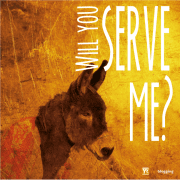6 Ways to Take Your Relationship Deeper
When my family and I moved across continents, our lives were stripped down, and being in a new place made everything about three steps harder. I realized in those situations how desperately I needed friends. Real friends, who would plop down on my back porch while our kids got muddy, and who would swap their hearts’ stories with me. I needed friends who would show up when my husband had malaria or put an arm around my shoulder when I wasn’t there for my grandpa’s funeral.
God knew that we needed friendships that loved intrusively. It’s how Jesus loved us—setting aside His status (as God!) to get dirty in our mess. He swapped a throne for a reeking stable, put on diapers, went through puberty and single adulthood. Then, He took what I was carrying, and made it His own (Philippians 2:5-8). After all, “This is how we know what love is: Jesus Christ laid down his life for us. And we ought to lay down our lives for our brothers and sisters” (1 John 3:16). Is that what should characterize our friendships? As laying down our own lives?
This is vital. Wherever you are.
But to reach that stage, I needed to build my friendships from scratch. And here are a few things I found useful to deepen my friendships:
1. Ask good questions and be willing to share
One of my favorite questions—though admittedly it can occasionally sound cheesy—is, “How’s your heart?” It’s my way of saying, How are you, really—on the inside? What are you wrestling with in there?
Of course, sometimes we simply want to be the one to whom people tell stuff; to be the confidante, the counselor. But love doesn’t let us get away with always being the giver in relationships. In the Bible, Peter had to allow Jesus to wash his feet (John 13:8-10) and Jesus allowed a woman to bathe his own feet in expensive perfume, and wipe them with her own hair (Matthew 26:7-11).
When I find myself slipping into that role of “always the giver”, it can help to be straightforward with friends: Hey, I tend to let my friendships be a little one-sided, because I get uncomfortable when people ask me questions. So I’m telling you this so you can call me out on it, and keep pursuing me.
2. Ask how you can pray for them
Praying is one of the most intimate forms of love. We’re fighting for someone, about their most intimate desires, fears, and concerns. I want to get into the spiritual boxing ring of prayer (like Jacob, who wrestled with God) alongside my friends, for them and the ones they love. I want us to at least get to the level of, “What would you ask God for right now? What matters the most to you that you’re wrestling with? What’s sitting on your heart like a big elephant?”
Sometimes, friends are too weary to pray for themselves. They might feel too afraid or alienated from God. They might feel grief or concern that overwhelms any words. They might not know what to say. It is such a privilege that I can pray for them.
Who do you know who might not have a lot of people praying on their behalf? Practically speaking, consider calling to check up on how they’re doing, or sending a text message or note in the mail to let them know some of the verses and thoughts you’re praying for them.
3. Tell the truth
I’m challenged by the simple words of Ephesians 4:25, “Therefore each of you must put off falsehood and speak truthfully to your neighbor, for we are all members of one body.” Reality is, I have not always treated my friends as if they are members of my own body, communicating like my own body does with itself.
I am not false—not in the intentionally lying sense—but I am not always intentionally truthful, for the sake of “kindness” or my own security. I am not always faithful to speak the truth or say what someone might not want to hear. I may not love enough to be courageous.
If a friend is, say, caught in sexual sin—then I should care enough to quietly say, “I think I need to tell you what you probably already know. This is destroying you. I think you could dream a lot bigger—for a faithful, forever relationship that really valued you, and where you value them back.”
Honestly, when I’m not truthful with a friend, when I’m holding back, I can feel that between us. My friendships will only grow as deep as we both allow them to go.
4. Be vulnerable
Vulnerability takes so much security—first, in our vertical relationship with God. I find a direct correlation between my own humility and my ability to be transparent with other people. Humility says, I’m weak, a flawed sinner. That’s who I am. But God loves me. And that’s who I am. God’s love gives me the courage to be vulnerable and risk rejection.
Sometimes a lack of vulnerability may be because someone isn’t trustworthy. But more often it’s from self-protection; from a fear that if people know who I am, I’ll be rejected. Honestly, I used to wait for others to pursue me as a display of their concern for me—and sometimes still do. But knowing I always have God’s love gives me the courage to be vulnerable with others. And recognizing my own weakness before Him helps me acknowledge my own need for others to shoulder what I’m carrying (Galatians 6:2); that it’s not good for me to be alone (Genesis 2:18); that I can’t say, “I don’t need you!” to those God has given me in community (1 Corinthians 12:21).
Jesus is our ultimate example of vulnerability. He put Himself in a killable, dirty-able human body; He died naked, shamed and broken. Talk about vulnerability! I’m not saying we trust anyone with our most intimate, painful areas. After all, Jesus had his own concentric circles of friendship—His intimate three, then 12 disciples, then 72, then the crowds. But friendship is rewarding proportional to the courage and intimacy we’re willing to extend; and the bar that Jesus set—love one another as I have loved you (John 13:34)—is one that will take the rest of my life to pursue.
5. Be relentless
Not in a “I’m your friendly neighborhood stalker” sort of way, but in a kind of way that doesn’t look to our own interests, but to the interests of others (Philippians 2:4).
Our current society does not seem to encourage true community well—for relationships that go the distance when it’s inconvenient, unhappy, sweaty, and generally uncomfortable. Thanks to social media we may still be in touch with people from high school—but we may also have 580 “friends” who assume they know us because of our status updates.
For relationships to go deeper, we need to be willing to tirelessly pursue them. Social media, of course, can also be a way to simply care for others more than ourselves; to love well, now that we know what’s going on. I’ve got to be willing to initiate, to crowd my calendar with people rather than just events. . . to be secure enough that friendships aren’t all about me.
6. Be aggressive about forgiveness
Forgiveness is easy to elude, right? It’s easy to choose blame, a hard heart, an alienated relationship. Forgiveness goes against all that’s natural in us. I’m amazed at how petty I can get about small “insults” from a friend—ways he or she seemed thoughtless and didn’t read my mind, things that seemed “obvious” because of my unique composition (which is why I need a friend in the first place), ways that someone didn’t return a kindness.
Friendships squeeze me into the discipline of returning a blessing for a perceived insult; of loving extravagantly. I’ve had to return in my own friendships with “I’m sorry”—with my own need for their mercy and graciousness. I am fascinated by this thought from American pastor and scholar Ligon Duncan that tells me a lot about relationships in general: “People don’t fall out of love. They fall out of repentance and forgiveness.”
After all, our affections follow our ability to extend and receive grace in imperfect relationships.
You can see that a lot of these ideas begin with a common, perhaps unexpected trait: humility, fastened tightly to love as the motivator in our relationships.
This year, may your relationships press into the next level of loving as Jesus loves us.











Leave a Reply
Want to join the discussion?Feel free to contribute!